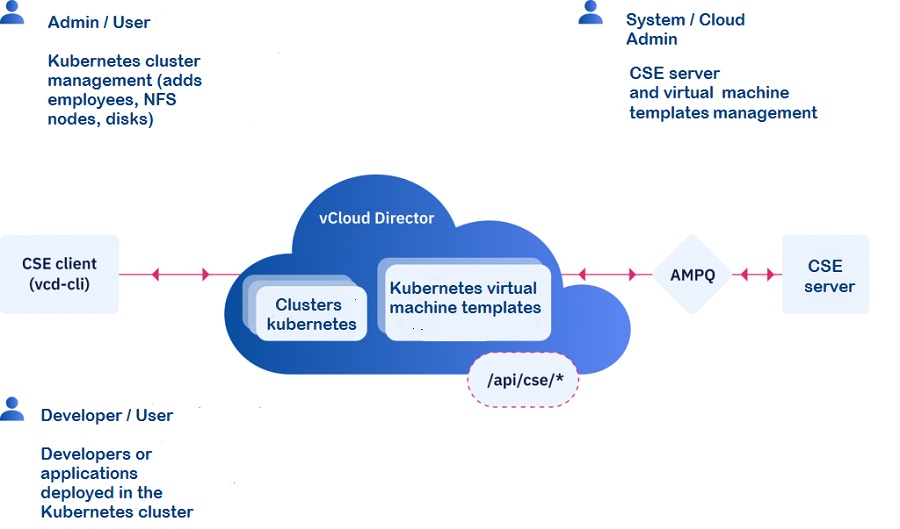Kubernetes as a Service (KaaS)
Cloud4U makes it easier and more affordable to work with Kubernetes in the cloud.
We provide a reliable, scalable virtual machine infrastructure that is compatible with Kubernetes. Deploy, scale and manage Kubernetes clusters with Container Service Extension (CSE), a proven open source solution.
Cloud constructor
* Cost of minimum virtual infrastructure (VM). The service is calculated for each user on request.
Kubernetes Cluster Usage Scenarios
- Auto Scaling
Automatic scaling allows you to monitor current application demand and, if necessary, reduce or increase the amount of resources used within certain limits. This allows you to avoid paying for unused resources and not worry about growing business needs.
- Streamline Workflows
Kubernetes clusters come with built-in monitoring, logging and metrics collection capabilities. This allows you to track statistics and review event logs to analyze cluster health and monitor user actions.
- Application Migration
You can move containerized applications from one Kubernetes cluster to another with minimal changes.
- Creating Test Environments
Software developers can run code/software in a test environment with different settings to evaluate future behaviour in a real-world environment.
- Security and compliance
Optional security plugins help ensure that applications and containers are protected from data leaks, cyberattacks, and other incidents.
How Kubernetes-as-a-service works
Kubernetes-as-a-Service is a cloud-based approach to container orchestration. The solution automates the process of managing, scaling, modifying, updating and deleting Kubernetes containers. It makes it easy to deploy an automation platform, build and run on M8KS clusters, and conduct development in a reliable computing environment. Store Docker images with your infrastructure, get fast image downloads and avoid external traffic costs. And never worry about infrastructure security and fault tolerance.

Kubernetes-as-a-Service (KaaS) is delivered on the Container Service Extension (CSE) and supports major containerization technologies, including Docker. CSE implements the KaaS solution in the cloud dashboard through the creation of virtual machine templates, enabling organizations to deploy complete Kubernetes clusters for containerized applications.
Cloud4U's containerized infrastructure is organized for flexible customization. The solution does not require in-depth knowledge - it easily automates application lifecycle management (from application deployment to shutdown).
The solution reduces Kubernetes deployment time from days to 15 minutes. Developers can focus on writing code without worrying about the system the application will eventually run on. High performance and efficient traffic distribution accelerate their work.
Kubernetes in Cloud4U cloud infrastructure
- Ever-growing Kubernetes system features
- Flexible cluster configuration settings
- Streamline CI/CD processes for creating and managing test environments
- Access to popular systems (DBMS, CMS) via Helm and catalogues Kubeapps and Docker Hub
- Node replication across three availability zones
- Ability to create a private cluster in an isolated environment
- Easy migration of applications from local machines to the cloud
- Integration with other Cloud4U solutions
FAQ
What is Kubernetes?
What is a Kubernetes cluster?
How is Kubernetes container service managed?
What is Kubernetes as a Service (KaaS)?
Why do I need Kubernetes as a service?
How does Kubernetes as a Service work?
What are some common challenges of operating Kubernetes in-house?
What are some benefits of using Kubernetes as a Service?
